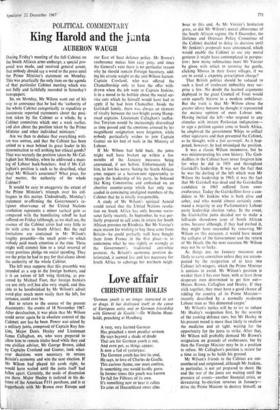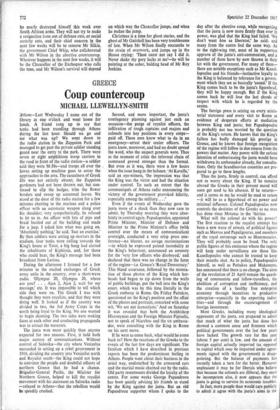King Harold and the junta
POLITICAL COMMENTARY AUBERON WAUGH
During Friday's meeting of the full Cabinet on the South African arms embargo, a special pro- pos:al was made, and received general assent, that nobody should say a word to the press until the Prime Minister's statement on Monday. This was practically the only item on the agenda of 'that particular Cabinet meeting "which was not,fully and faithfully recorded in Saturday's newspapers.
So, on Monday, Mr Wilson went out of his way to announce that he had the 'authority of the whole Cabinet categorically to repudiate as inaccurate reported statements about the posi- tion taken by the Cabinet as a whole, by a Cabinet committee which met a week earlier, and also about the position taken by the Prime Minister and other individual ministers.'
Are we then to deduce that everything writ- ten =was untrue, and that the Cabinet has been united to a man behind its great leader in his determination to sell nothing but ethical goods? That was scarcely the position taken. by Mr Cal- laghan last Monday, when he addressed a meet- ing of Labour back-benchers. And, if Mr Cal- laghan's position is such as he described, what price Mr Wilson's assurance? What price, for that 'matter, the authority of the whole
Cabinet? _ It would be easy to exaggerate the extent of the Prime Minister's triumph over his col- leagues in this matter. Undoubtedly, Monday's statement re-affirming the Government's re- ligious observance of the United Nations resolution represents a minor tactical gain as compared with the humiliating rebuff he had suffered on Friday (although, as we shall see, the essence of the Cabinet crisis had very little' to do with arms to South Africa). But the real limitations are contained' in Mr Wilson's lengthy preamble—the small print—to which nobody paid much attention at the time. These might well commit him to a total reversal of every previous pledge on social spending. They are the price he had to pay for that clause about the authority of the whole Cabinet.
The, left may suppose that this preamble was intended as a sop to the foreign banker's, and it is an axiom of left wing thinking, as pre- sented by Michael Foot, that foreign bankers are not only evithrit also very stupid, and thus able to be hoodwinked by Mr Wilson's adroit word-play much more easily than the left, for instance, could ever be.
But to return to the source of the present discontents: the events of 18 November 1967. After devaluation, it was plain that Mr Wilson could never again be in absolute control of the Cabinet; nor has he been. Power was seized by a military junta, composed of Captain Roy Jen- kins, Major Denis Healey and Lieutenant James Callaghan, RN, who were prepared to allow him to remain titular head while they and one civilian adviser, Mr George Brown, aided by Captains Crosland and Gunter, took what- ever decisions were necessary to restore Britain's economy and win the next election. If Mr Wilson had played his cards right, he would have waited until the junta itself had fallen apart. Certainly, the seeds of dissension are there. Major Healey is isolated in his de- fence of the American Fill purchase, and is at loggerheads with Mr Brown over Europe and
our East of Suez defence policy. Mr Brown's exuberance makes him easy prey, and since the General's veto there is no particular reason why he should remain Foreign Secretary, add- ing his erratic weight to the anti-Wilson faction. Captain Crosland, who was offered the Chancellorship only to have the offer with- drawn when the job went to Captain Jenkins, is in a mood to be bolshie about the social ser- vice cuts which he himself would have had to apply if he had been Chancellor. Inside the Gaitskell family, there was always an element of rivalry between the two bright young Hamp- stead captains. Lieutenant Callaghan's ineffec- tive Toryism would be increasingly discredited as time passed and the emotions aroused by his magnificent resignation were forgotten, while nobody particularly wishes to join Captain Gunter on his bed of nails in the Ministry of Labour.
If Mr Wilson, had held back, the junta might well have broken up within a few months of the January measures being announced, if not before. Unfortunately for him, he lost his nerve. Seeing the South African arms request as a heaven-sent opportunity to regain the leadership of his party, he behaved like King Constantine and embarked on an abortive counter-coup which has only suc- ceeded in convincing unaligned members of the Cabinet that he is totally irresponsible.
A study of Mr Wilson's spiritual Aeneid would reveal that the United Nations resolu- tion on South Africa has only become sacro- sanct fairly recently. In September, he was per- fectly prepared to sell arms in return for South African pressure on Rhodesia. But Mr Vorster's main reason for wishing to buy these arms from Britain—he could perfectly well have bought them from France in the first place—is to undermine what he sees rightly or wrongly as the Government's traditional anti-white postures. As Britain's economic position de- teriorated, it seemed less and less necessary for South Africa to sabotage her northern neigh- hour to this end. As Mr Vorster's hesitation grew, so did Mr Wilson's moral abhorrence of the South African regime. On 8 December, the Defence and Overseas Policy Committee of the Cabinet decided to delay its decision until Mr Jenkins's proposals were announced, which would enable the Cabinet to see any moral gestures it might have contemplated in perspec- tive: how many submarines must Mr Vorster be given with which to terrorise the gentle, clicking Xhosas in their forest villages, if we are to avoid a sixpenny prescription charge?
That British politics should be reduced to such a_ level of irrelevant imbecility may sur- prise a few. No doubt the learned arguments deployed in the great Council of Trent would seem equally bizarre to a modern unbeliever. But the truth is that Mr Wilson chose the greater idiocy because he thought it represented the mature opinion of most Labour MPS. Having incited the left—who respond to any stimulus with instant Pavlovian indignation— to sign a petition against arms to South Africa, he employed the government Whips to collect other signatures and then presented the Cabinet, as he thought, with a fait accompli. As it hap- pened, however, he had misjudged the position.
It was a classic Wilson manoeuvre, but he was misinterpreting his own history. The Gait- skellites in the Cabinet have never forgiven him for what he did in 1951 and throughout Gaitskell's leadership. It was not the fact that he was the darling of the left which won Mr Wilson the leadership in 1963; it was the fact that Mr Gaitskell was dead and the Gaitskellite candidate in 1963 suffered from over- exuberance. Today the Gaitskellites have a can- didate in Mr Jenkins who is both alive and sober, and who would almost certainly com- mand a majority in any Parliamentary Labour party leadership election today. In the event, the Gaitskellite junta decided not to make a full-scale showdown issue of South African arms, because although, if they had pushed it, they might have succeeded by removing Mr Wilson on this occasion, it would have meant the collapse of the Government and the return of Mr Heath. On the next occasion Mr Wilson may not be so lucky.
As things are, no January measures are likely to carry conviction unless they are accom- panied by the resignation of at least two Cabinet left-wingers, which the Prime Minister is anxious 'to avoid. Mr Wilson's position is weaker than it has ever been, with at least three desperate men determined to get him out— Messrs Brown, Callaghan and Healey. If they stick together, they must have a good chance of ridding the country of its Prime Minister— recently described by a normally moderate Labour man as 'this demented coypu.'
Mr Wilson's tactics will be to try to induce Mr Healey's resignation first, by the severity of the coming defence cuts; but Mr Healey in his present mood is more than likely to swallow the medicine and sit tight. waiting for the opportunity for the junta to strike. After that, Mr Wilson will probably demand Mr Brown's resignation on grounds of exuberance, but by then the Foreign Minister may be in a position to refuse. Mr Callaghan's position is secure for a time so long as he holds his ground.
Mr Wilson's friends in the Cabinet are out- numbered and outgunned, although Mr Jenkins, in particular, is not yet prepared to shoot. He and the rest of the junta are waiting until the pressure of events—another financial crisis, or devastating by-election reverses in January— drive the Prime Minister to destroy himself, as
he nearly destroyed himself this week over South African arms. They will not try to make a resignation issue out of defence cuts, or social security cuts, and their chief concern in the next few weeks will be to remove Mr Silkin, the government Chief Whip, who collaborated with Mr Wilson in the abortive countercoup. Whatever happens in the next few weeks, it will be the Chancellor of the Exchequer who calls the tune, and Mr Wilson's survival will depend
on which way the Chancellor jumps, and when he makes the jump.
Christmas is a time for ghost stories, and the ghost of Mr Gaitskell has been very troublesome of late. When Mr Wilson finally succumbs to the strain of overwork, and jumps up in the House crying : 'Thou canst not say I did it. Never shake thy gory locks at me'—he will be pointing at the sober, balding head of Mr Roy Jenkins.



































 Previous page
Previous page